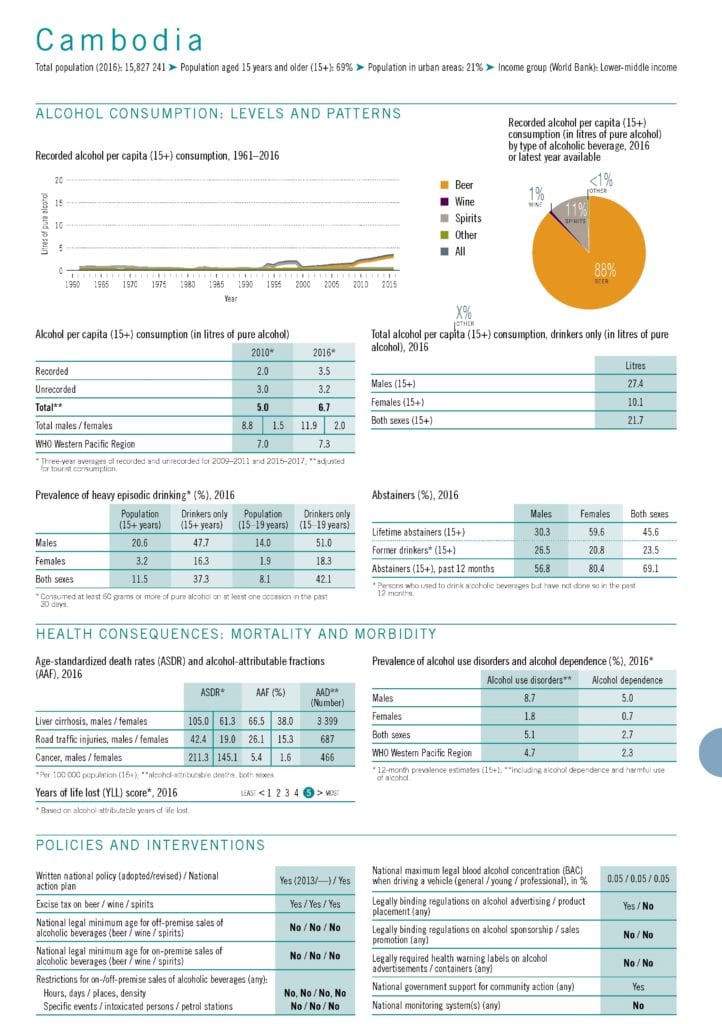The National Road Safety Committee of Cambodia has signed a memorandum with the International Business Chamber of Cambodia (IBC) to corporate in promoting road safety. While looking good on paper, digging a little deeper shows this is another effort by Big Alcohol to exploit the road safety agenda for their profit interests.
Major alcohol producers Heineken (Cambodia), Pernod Ricard (Cambodge), Cambrew Ltd., and craft brewery Hope Garden are all members of the IBC.
High-level officials in Cambodia were part of the signing ceremony for the memorandum held on May 17, 2022 at the Ministry of Public Works and Transport (MPWT). The event was presided over by Mon Manvi, Secretary of State of the Ministry of Public Works and Transport and Secretary-General of the National Road Safety Committee.
The Alcohol Industry’s Involvement With Road Safety NGOs
The alcohol industry attempts to use CSR-type road safety programs to appear as good corporate citizens. Not only that, the alcohol industry then uses these types of CSR programs to gain access to policymakers, lobby for favorable policies to maximize Big Alcohol profits, and avoid public health-oriented alcohol policy making which threaten their profits.
A recent study published in Globalization and Health showed that there was a clear effort by the alcohol industry to partner with road safety NGOs around the world.
Findings underscore the need for the road safety community to generate consensus on the involvement of the alcohol industry and suggest the need for more transparency on details of partnerships involving road safety.
Findings also highlight the importance of local and national government support of road safety initiatives and road safety NGOs to avoid dependence on controversial funding from the alcohol industry.
An article published in the journal Health Policy and Planning reveals that the alcohol industry views driving under the influence of alcohol as an issue but at the same time argues for ineffective solutions that would limit the impact on alcohol sales.
Alcohol companies have a massive conflict of interest, not only in the area of public health policy but also in the area of road safety.
Meanwhile, in Cambodia, 687 people died due to alcohol-related road traffic accidents in 2016, according to the World Health Organization. That is almost two preventable deaths every day.
The alcohol industry and road safety measures
The alcohol industry and its lobby front and CSR groups use engaging in road safety measures to influence policymakers to design alcohol policies favorable to the interests of Big Alcohol instead of public health and safety. These policies are usually large awareness or education programs and not comprehensive driving under the influence laws, such as reducing the blood alcohol content (BAC) levels. By doing so the alcohol industry disregards the lives that are being lost every day in road traffic crashes due to their own products.
An example of this Big Alcohol strategy is seen in India, where Big Alcohol – specifically Pernod Ricard – was lobbying against laws that banned alcohol outlets near major roads in 2019. This was despite statistics that showed there are 60,000 fatal crashes on Indian highways annually. Over 70% of these fatalities are caused by alcohol.
Later on, Big Alcohol giant Diageo started engaging in road safety programs in India in their strategy for market dominance in the country.
The alcohol industry diminishes road safety while trying to paint a positive image about their brands and “social responsibility” by engaging in road safety programs. For example in Australia, Big Alcohol planned to open an alcohol superstore right next to the highway and near alcohol-free aboriginal communities. Fortunately, due to heart-driven advocacy communities, civil society, and public health advocates, were able to block the proposed alcohol superstore.
Public health-oriented driving under the influence (DUI) laws can reduce road fatalities if Big Alcohol stopped opposing these laws
One scientific study in Chile found that two state interventions – the ‘zero-tolerance law’ (ZTL), which decreased BAC, and the ‘Emilia law’ (EL), which increased penalties for driving under the influence – decreased alcohol-related crashes.
In Utah, U.S. road traffic crashes reduced since the state government introduced a 0.05% BAC level which is the best BAC level implemented in the United States.
Another scientific study found not just DUI laws but policies that reduce overall alcohol consumption in the population lead to reduced alcohol-related road traffic crashes. According to the study, in Lithuania alcohol policies including increased taxation, reduction of availability, and a ban on advertisements from 2014 significantly reduced DUI crashes. On average, each implemented policy measure permanently reduced the proportion of alcohol‐attributable crashes by 0.55%.
It is evident that comprehensive alcohol policies, including DUI laws and population-level policies such as the World Health Organization’s recommended Best Buys, are what is needed to reduce rising road traffic crashes in Cambodia and the world.
But the alcohol industry continues to interfere against these effective policies to maximize profits at the cost of lives.

